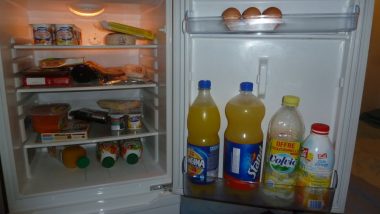Food poisoning is a condition that occurs by eating food that is contaminated by bacteria. Toxins produced by these bacteria are very harmful for the body. Caused generally due to Salmonella, E. Coli, Campylobacter and Clostridium Perfringes infections, Food poisoning should be treated immediately.
Many-a-times, people think that left-over food should be thrown out, but the best advice is to understand and learn how to store food, estimate the quantity, keep track on what to eat, what to avoid, and use left-over food correctly. Most of us are very particular on saving leftover food from the previous night, with a hope that it will get finished by next day. But, one might just forget about it, and it will grow stale in the refrigerator. If one eats this food without considering expiry and storage, it could cause stomach infections.
Here are few examples of the foods you eat every day, storage frequency and its shelf-time
CHAPATI’S OR ROTIS- These should not be stored for more than two days, if stored in a dry place it will not spoil but it will definitely spoil if it’s stored in moist place.
RICE- The bacteria present in Rice can cause food poisoning even if it is well-cooked, one must keep in mind that Rice must be heated/ re-heated properly before eating. While rice can be stored well for up to three days, it tends to become dry.
VEGETABLE PREPARATIONS (SABJI)- Cooked vegetables can be stored into the refrigerator, but not more than 3-4 days. On the 5th day, its quality turns bad, it starts to deplete, smell and loses all its nutritional value, taste and flavor. Especially during the monsoon, one must not re-eat the sabji beyond next day. Sabjis made with Onion or Paneer should be consumed immediately.
CHICKEN AND RED MEAT- Leftover Chicken and Mutton should not be stored for more than 3 days. This preparation must be properly cooked, cooled and then refrigerated. It is recommended that this preparation be thoroughly re-heated before eating.
DAIRY PRODUCTS- It is always advisable to store Yogurt, Cream, Milk, etc. in its original packing; but if you open it, it must be re-wrapped, clipped and stored in the refrigerator immediately. Products like Cheese can be stored for a month or more, whereas Milk, Cream and Yoghurt should not be kept for more than 5days.
Type of food containers matter too: Plastic or metal or silicon?
PLASTIC- The toxins and chemicals that leach from plastics into the food, have shown to imitate hormones and cause Hormonal Imbalances, Infertility, early onset of Diabetes, Hypertension, Cancers, especially Breast Cancer. When plastic is heated, it leaches chemicals 55 times faster than normal. So, avoid microwave heating, even if the container “microwave safe”
SILICON- Silicone is not toxic to aquatic or soil organisms, and it is not considered as hazardous waste. If you are using Silicone containers, you will have no strange smells or tastes, when you finally eat that pasta you put in the fridge
METAL- It is not safe to store food in just any metal container, as it might get contaminated. Acid present in fruits such as Tomatoes, Apples, and Pineapples react with certain metals like Aluminum. Similarly, when you store pickles in Brass containers, the Acetic Acid the pickle reacts with the metal, releasing harmful Metal Oxides or toxic compounds.
The best way to store foods, as per their ideal perishable limit, is in steel or silicon containers. Adopt safe food storage practices, this will certainly bring down the incidences of stomach infections and food poisoning!
Here are some tips to help minimize your risk of food poisoning:
- Follow good hand hygiene: Wash your hands with soap and water before preparing food. Always wash your hands after handling raw meat
- Avoid cross-contamination: Use separate chopping boards and knives, especially for raw meat and poultry
- Cook meat thoroughly: Make sure meat and poultry are cooked through to the center. Uncooked and undercooked meats spike the risk of food poisoning
- Wash leafy greens, vegetables and fruits before eating them: Bought pre-packaged from the store or from the vendor round the street, thorough washing of fruits and veggies is a must
- Temperature: Don’t leave leftovers sitting at room temperature. Instead, put them in the fridge or the freezer
(This article is contributed by Jaee Khamkar, Dietician, Fortis Hospital Kalyan)
(The above story first appeared on LatestLY on Sep 09, 2018 08:33 AM IST. For more news and updates on politics, world, sports, entertainment and lifestyle, log on to our website latestly.com).













 Quickly
Quickly


